

  |
|
|
||||||||||||||||||||||
|
FMS FEATURE... February 23, 2015 Oscar Music Awards Make "Glory"-ous History Alexander Desplat scores win for Grand Budapest Hotel by Jon Burlingame 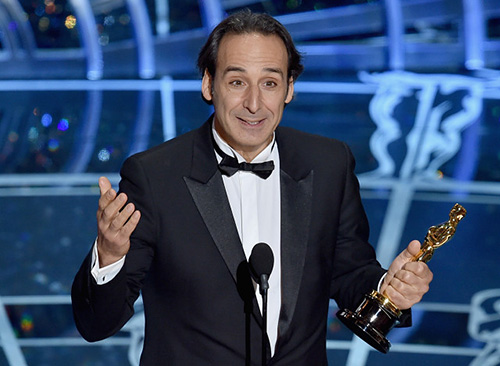 Alexandre Desplat A composer nominated twice in the same year in Oscar's original score category almost never wins. Twelve times in the past 50 years of Oscar nominations, a composer competed against himself – and, before last night, only once did that composer win: John Williams, in 1978, for Star Wars (the other nomination was for Close Encounters of the Third Kind). With nominations for both The Grand Budapest Hotel and The Imitation Game, it was widely believed that Desplat would be the victim of a split vote, and that Johann Johannsson would take the Oscar for The Theory of Everything. So the announcement that Desplat (prior to 2014, a six-time nominee for films including The Queen, The King's Speech and Argo) was the winner for Grand Budapest came as a welcome surprise. Hugs from his fellow music nominees, along with one for director Wes Anderson, preceded the French composer's ascent to the stage to accept from presenter Julie Andrews. "It's been a beautiful decade in Hollywood for me," he said. "I've worked with great directors and producers and I'm very grateful." He paid tribute to his wife Solre (a violinist who played on his first film session), adding, "You made everything happen for me." Fifteen minutes earlier, on the heels of a moving performance of their song "Glory" from Selma – which earned the night's first standing ovation – songwriter-performers John Legend and Common won the Best Song Oscar. Their inspirational speech earned a second standing ovation. 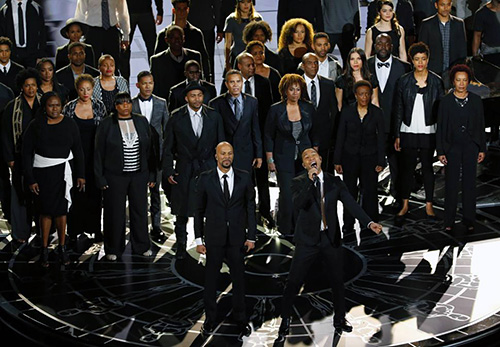 "Glory" 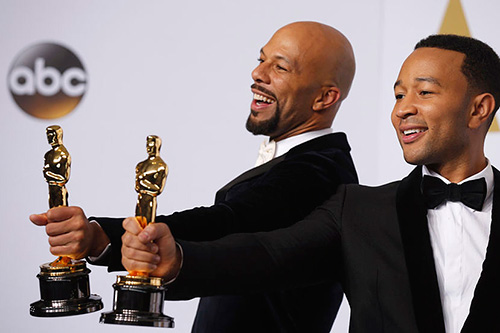 Common and John Legend The 87th Academy Awards show was an especially musical Oscarcast, with host Neil Patrick Harris opening the show with a new Broadway-style production number, "Moving Pictures," by Frozen songwriters Robert Lopez and Kristen Anderson-Lopez (and fun guest appearances by Anna Kendrick and Jack Black). 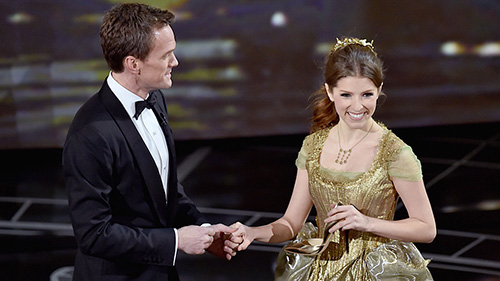 Neil Patrick Harris and Anna Kendrick in opening number "Moving Pictures" The "in memoriam" segment was disappointing for its lack of any music people despite the loss last year of Oscar winner Ken Thorne (A Funny Thing Happened on the Way to the Forum) and nominees Ian Fraser (Scrooge), Gil Askey (Lady Sings the Blues) and Gerry Goffin (Mahogany). Thorne's photo is on the Oscar website, but the others are merely listed by name. 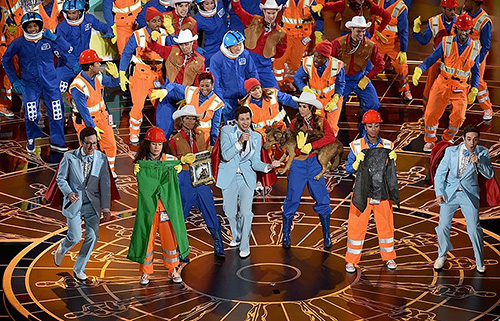 "Awesome" First-time Oscar music director Stephen Oremus conducted the 68-piece Oscar orchestra not at the Dolby but via remote from nearby Capitol Records (still a bone of contention among many studio musicians and music lovers). Sally Stevens was once again choral director, supervising a 40-voice gospel choir in "Glory" and a 20-voice choir accompanying Lady Gaga and the "Awesome" number. Ryan Shore was assistant music director. 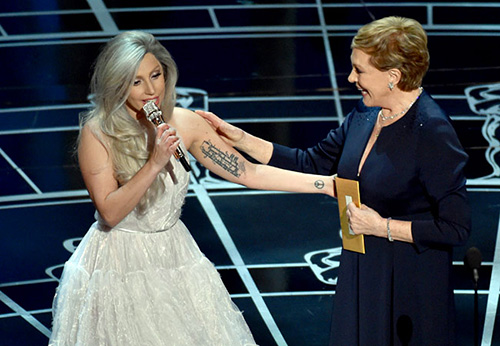 Lady Gaga and Julie Andrews Academy music governor Charles Bernstein introduced the affair and SCL president Ashley Irwin introduced each nominee, presenting all with commemorative batons. Desplat, noting that he was a double nominee, joked, "Can I have two?" Songwriter Diane Warren ("Grateful") pointed out that "it's a good weapon!" 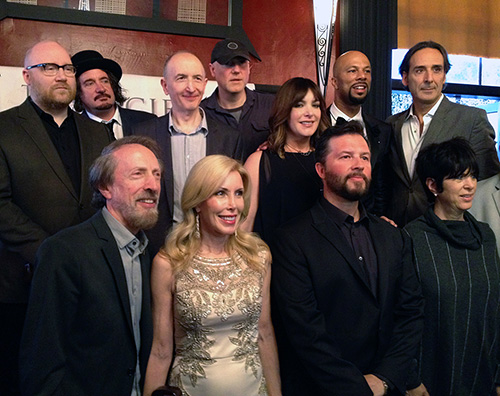 Back row, L to R: Johann Johannsson, Julian Raymond, Gary Yershon, Gregg Alexander, Danielle Brisebois, Common, Alexandre Desplat Front row, L to R: Academy music governor Charles Bernstein, Kim Campbell, Shawn Patterson, Diane Warren ©2015 Jon Burlingame |
Search
Past Features
|